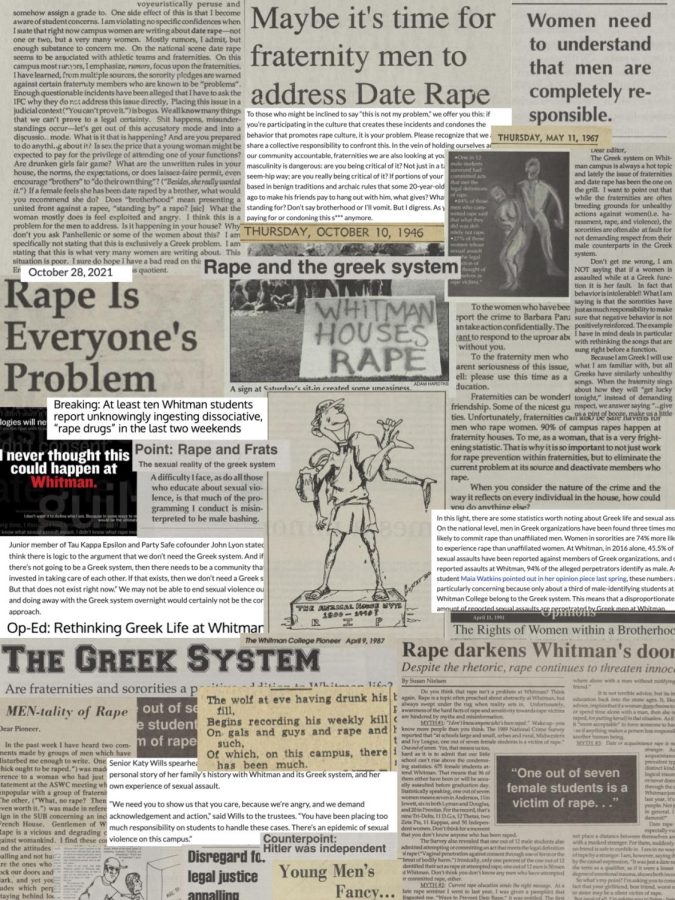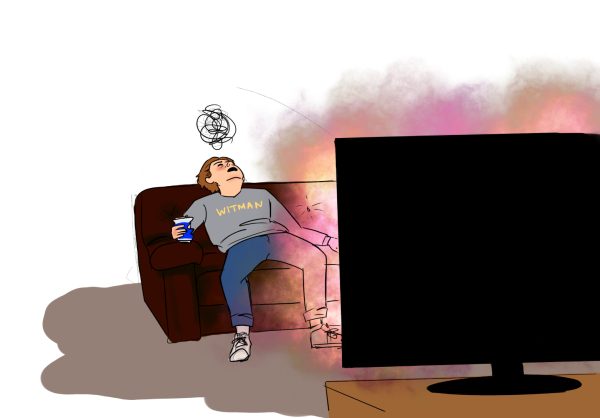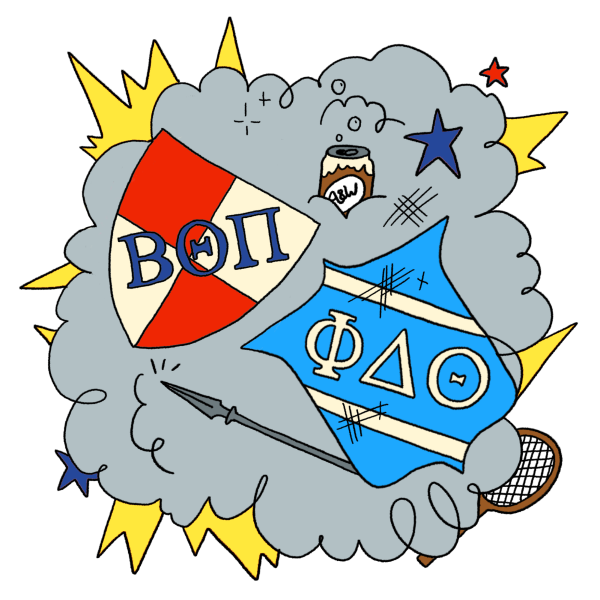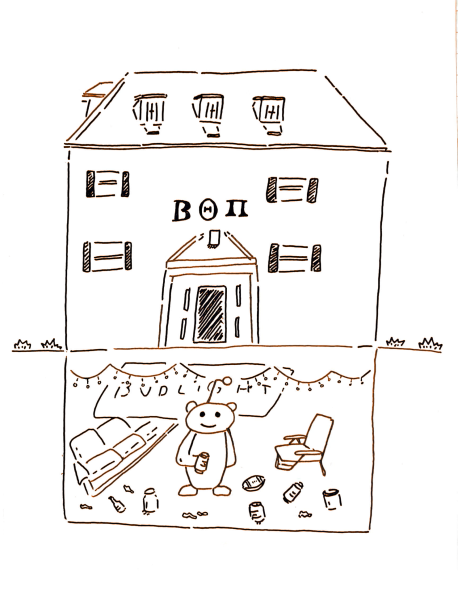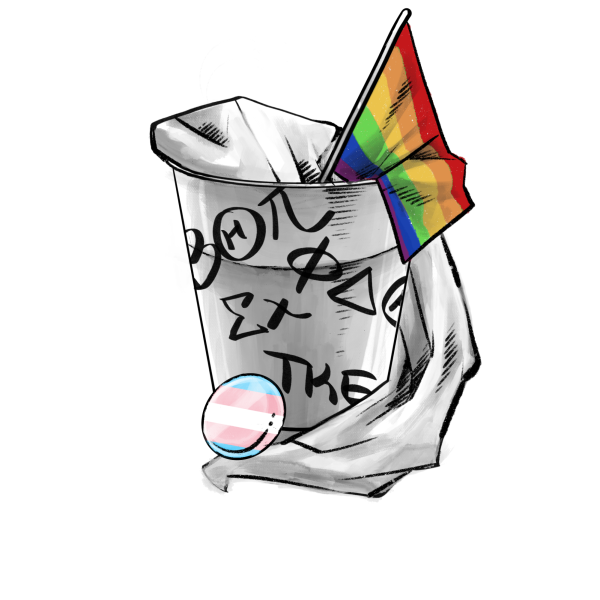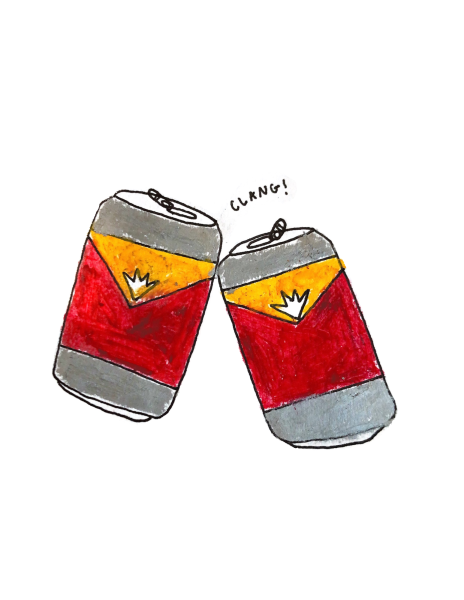Op-Ed: Greek Life & Rape: a Look Into Student Voices Throughout Whitman’s History
February 10, 2022
CONTENT WARNING: This article contains a detailed discussion of rape and sexual assault.
RESOURCES:
RAINN, 800-656-4673
Malia Lewis, Whitman’s Sexual Assault Victims Advocate (not a mandatory reporter), 509-526-3032, [email protected]
Saunie Schuster, Interim Title IX Coordinator, 509-524-2049, [email protected]
October 10, 1985: “Nobody believes that gang rapes are a normal practice on campuses, and I doubt that most young men are prone to rape on their own initiative. Rather it is the system of social grouping and peer pressures that occasionally clouds the judgment of many individuals. The institutional structure that I think is responsible is single-sex social groups (fraternities and sororities as they now exist).”—John Du Nann Winter, “‘Fororities and Saternities’: Living Together?”
April 4, 1991: “Last year, I was the victim of the ultimate form of sexism: rape. It happened in your house, by one of your members, during a fraternity party.”—Anonymous, “TKE forum provokes woman to speak out about rape and sexism”
April 11, 1991: “Fraternities can be wonderful places for growth and friendship. Some of the nicest guys I know are in fraternities. Unfortunately, fraternities can also be safe havens for men who rape women. 90 percent of campus rapes happen at fraternity houses. To me, as a woman, that is a very frightening statistic. That is why it is so important to not just work for rape prevention within fraternities, but to eliminate the current problem at its source and deactivate members who rape.”—Susan Nielsen, “The Rights of Women within a Brotherhood”
September 15, 2005: “There is no study that links Whitman greek to Whitman rape, rather, the evidence links all frats to rape: it’s not what they do or who is in them, it’s what they are.”—Andrew Hookom, “The sexual reality of the greek system”
April 5, 2018: “Despite clear evidence that a fraternity brother was a rapist, that brother continued to live in his fraternity house until expelled; the leadership didn’t think it was their job to punish people. Sexual assault absolutely occurs in non-Greek spaces. However, these dynamics seem exacerbated by Greek life. No amount of glitter can cover up rape and sexual assault perpetrated in fraternity houses.”—Nidhi Jaltare, “Glitter Ball: Queering the Fraternities”
I was part of Greek life for two years. In March of my sophomore year, I was raped by a fraternity member. Since I was raped my voice has been repeatedly silenced. Every time I felt ready to speak up, I would get shut down.
I was raped off-campus, therefore—thanks to former Secretary of Education, Betsy DeVos—I am unable to file a Title IX report against my assaulter. I have been afraid to speak up because it has been, and will always be, my word versus his.
I write this not to ask for sympathy or as a means to solely share my story; rather, to show how personal this issue is to me, and also how horrifically common this experience has become.
I started to see a pattern with survivors like me; people who similarly feel silenced and threatened. There’s something that happens when I tell people I’ve been sexually assaulted; I begin to have more and more survivors reaching out to me to share their story. It has made me feel less alone, it allows for a community of silent support, but it also makes me frustrated.
So many people our age have been sexually assaulted. Rape is a serious and ugly crime. Rape leaves you empty. Rape causes you to hate your body; every time you look in the mirror you remember. Above all, rape is a crime of power. Survivors feel defenseless, small and powerless.
I am sick of hearing these stories. I would not wish rape on my worst enemy. Regardless if you have been sexually assaulted or not, there is a universal understanding that rape is one of the worst things that you can do to another person.
I want there to be a system that holds people accountable. I want Whitman to find patterns and change environments to create places that prevent rape. We need to abolish places where rape is likely.
While I understand rape to be fully the fault of the rapists, there are environments that foster rape culture and rape sympathizers. Last fall, I took a library class where we conducted research looking into digital archives. I began to find handfuls of stories from survivors in The Wire. Starting in the 1970s, survivors have vulnerably and bravely shared their stories. These articles desperately ask the Whitman community to listen to their trauma and to either change or abolish Greek life.
This concern dates back further than any of us have been on Whitman’s campus. It is an endemic issue. Using records of The Wire, I looked for correlations between different accounts of rape on Whitman’s campus in order to find the systemic factors aiding the perpetuation of sexual assault on campus. While I understand the importance of the intersectional traumas that Greek life has produced across the country and at Whitman, it is not the intent of this article to address other injustices.
Over the past four months I sorted through all articles, dating back to 1896, searching the keyword rape. There are 736 articles in The Wire (formerly known as The Pioneer) including the word rape. There were 119 articles discussing rape on Whitman’s campus. (The other 617 articles used rape in a different meaning—detailed below). Out of those 119 articles, 44 linked rape to Greek life.
My hypothesis is that there is a correlation, as displayed in The Wire, between Greek life and rape.
I used Whitman’s search engine for digital archives, Arminda, to find The Pioneer articles. I used the Wire’s website to find The Wire articles. Through keyword searching on the different websites I then downloaded all 736 articles and ran them through ATLAS.ti, a digital computer software program that helped me search through each article. I looked for the words “rape,” “greek life,” “fraternity,” and “sorority.” I also read each article scanning for positive, neutral, or negative keywords or phrases in regards to Greek life. Furthermore, I found each article that was written by a survivor of sexual assault.
I understand that my statistics pool is skewed. I have understood that from the start. I am only looking at the voices published in the student newspaper. There is no doubt in my mind that there have been hundreds of others cases of sexual violence at Whitman College that have not been documented in The Pioneer nor The Wire. My goal is simply to see if there is a correlation between people that have spoken out via the student newspaper on rape on campus and Greek life.
Findings:
Out of the 736 articles, 617 did not pertain to rape at Whitman. Over the past 125 years the word rape has been used to describe things other than sexual assault. Such as: duck rape (discussions about ducks raping each other), the rape of environment, rape in plays or TV shows, rape at other colleges or communities unrelated to Whitman College.
There were 119 articles that discussed rape at Whitman College. Of these, 30 discuss sexual assault programs such as Green Dot and do not discuss the issue of rape at Whitman College. 20 are written from a survivor’s perspective. 44 connect Greek life to rape.
37 percent of the 119 articles on rape at Whitman also discuss Greek life. If you decide to remove the 30 articles that are resources for sexual assault survivors from the initial 119, that makes the percent of articles linked to Greek life 49 percent.
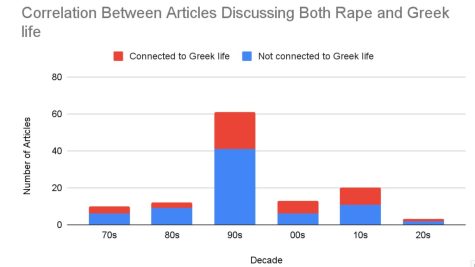
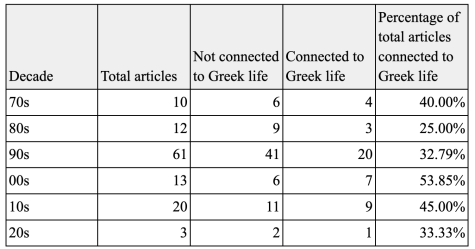
The table and graph above show the breakdown of the 119 articles discussing rape. We can see that in the 1970s and 1980s there were a similar amount of articles about rape in The Wire, however around 40 percent of them connected to Greek life in the 70s versus only 25 percent in the 80s. The 1990s are the most significant because there is a total of 61 article about rape; 33 percent of them discussing Greek life. In the 21st century there has been less articles discussing rape but still a large connection of them pertaining to Greek life.
I categorized the amount of articles about rape and the amount that connect to Greek life—whether positive, negative or neutral—depending on the decade in which the article was written. Out of the 44 articles discussing both rape and Greek life, 38 of them are negative or neutral (28 negative, 11 neutral), while only six of them speak positively about Greek life. The articles that discuss Greek life in a positive light speak of reasons why Greek life is not the reason rape happens at Whitman. All students, Greek or non-affiliated can be victims of rape and can rape. However it is clear that there is, and has been since the 1970s, correlation between Greek life and rape. Here are a few quotes from different articles with negative, neutral and positive claims about Greek life in relation to rape:
Negative
- “First, 48 percent of sexual assaults are reported against Greek men, yet Greek men only constitute a third of male-identifying students—which means a disproportionate number of Greek men are identified as perpetrators. But more importantly, the Greek community has the opportunity to catalyze change. We named fraternities because ending sexual misconduct within the Greek system will de-normalize rape culture within the rest of campus.” Maia Watkins, “Maia Watkins: Addressing Rape Culture” May 21, 2016
- “How many more letters from rape victims do we have to read before we pull our heads out of our asses and trash this fucking facade we so kindly call the Greek system. How much longer must we tolerate the existence of an organization where you can rape women with out fear of prosecution? After all, your brothers will defend you. How much longer must we listen to the tired old lie, ‘…one of the leading organizations in the fight against date rape is a fraternity.’? Must we continue to tolerate an organization where some PIECE OF SHIT can actually become notorious for raping women and then completely vindicate himself with a mere public apology? Do we really need an organization where a fraternity’s charter is more important than a woman raped by a member of that fraternity? How many more rapes does it take??? GET A CLUE, WHITMAN. THE GREEK SYSTEM FOSTERS RAPE. FUCK THE GREEK SYSTEM!” Marcus Epstein, “Down with Greeks!” April 11, 1991
Neutral
- “Abolishing the Greek system will not solve the problem. Working with women in identifying a rapist and then doing something about it will. Education will; it is perhaps one of most important factors in this issue.” Christopher Brucker, “Epstein Wrong” April 18, 1991
- “In making a statement in walking past the Greek houses, the leaders of the vigili imply that rape occurs only in a certain environment. Rape can happen anywhere; that should be common knowledge.” Peter Brandt, “Candlelight Vigil generates feedback from participants” April 15, 1993
Positive
- “The debate over the date rape has mainly focused on the Greek system, namely fraternity men raping sorority women. Frankly, this sucks. It assumes that the only men who rape are affiliated with a Greek organization and the only victims are Greek women. This is not fair to the Independent population of this college for several reasons…To their credit, the Greek system has take the initiative on this issue, but we must treat date rape as if it has no affiliation in order to be fair. As it was pointed out in the last issue of the Pio by Vergil Cabasco, it is a disservice to the men of the fraternities and the women of this campus to stereotype date rape with the Greek system. Let’s forget about the silliness of Independent vs. Greek and address this issue as a unified campus seeking an end to an extremely violent and reprehensible action against us all.” Kristin Burbach, “Rape is a problem for all” April 18, 1991
- “Case and point: Hitler was independent. Possibly the worst man ever was never a part of a Whitman fraternity…The actions of a few hypothetical greeks do not spoil the entirety of the Greek system, much like the actions of one Judas Iscariot does not spoil the entirety of the apostles. In general they were pretty all right.” Anonymous, “Counterpoint: Hitler was an independent” September 22, 2005
The graphic shows the percent of the student body in Greek life starting in the 1980s up to this past fall. As we can see there has been a steady decline, and in most recent years a sharp decline. The percentages above are not 100% accurate as they show all the individuals that have at one point joined Greek life at any point during their time at Whitman, whether or not they were in Greek life during that year, or whether or not they had already dropped their membership. For example, I have dropped my sorority but am still counted in this data set for 2018, 2019, and 2020 (the year I dropped). Because of this, these numbers probably inflate the percentage of students in Greek life in a given year.
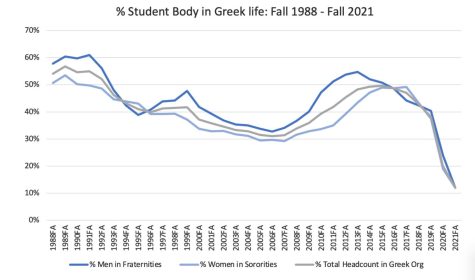
This semester, Whitman’s Greek life is undergoing an external review. While the external review will not decide the ultimate fate of Greek life, the external reviewers will provide recommendations to Whitman’s administrators.
In my three and a half years at Whitman, ongoing conversations regarding the possibility of an end to Greek life restart each new year. The substance of these conversations usually revolve around the expected demise of Greek life; I usually hear that, “Greek life is declining but has to die out naturally.” While the proportion of the student body in Greek life has drastically declined over the past couple years (from around 50 percent throughout the 1980s to the 2000s and then sharply declining in 2018, dipping to 12 percent in 2021), the notion that Greek life is coming to its natural demise implies that Whitman does not have an influence over what happens amidst the decline.
The administration’s “solution” of allowing Greek life to die out naturally represents a hands-off approach which, in practice, allows the institution to abdicate its responsibility of effectively grappling with an ongoing threat to the safety of Whitman students. Feeling unsatisfied with the College’s passive stance on the Greek life dilemma, I searched to find the institutional trauma and harm Greek life has caused at Whitman.
Greek life at Whitman is often considered different from Greek life at other schools. When I went through sorority recruitment I was told repeatedly that Whitman’s Greek system is different. While I bought into that pitch for a while, I now recognize that sales pitch for what it was.
Throughout the 1970s, 1980s, and 1990s there were many calls in The Pioneer articles blaming Greek life for rape and sexual assault, however, these articles mostly called for the need of new resources or a rebranding of Greek life to allow for Greek life to continue to flourish at Whitman. In the ’70s fraternity men walked women home after parties to ensure safety, in the ’80s and ’90s there was multiple rape forums held at fraternities to educate fraternity men.
However, these programs have failed. No matter what type of sexual assault prevention programs are put in place within the Greek system, the trend remains the same. Greek life at Whitman has been proven over and over to create environments prone to rape.
While I believe there are a number of reasons that it is overdue for the Greek system to be abolished, it is prominent to note the correlation between rape and Greek life.
We need to hold the Whitman community accountable, therefore it is necessary to disband systems that continue to cultivate climates prone to sexual assault.



